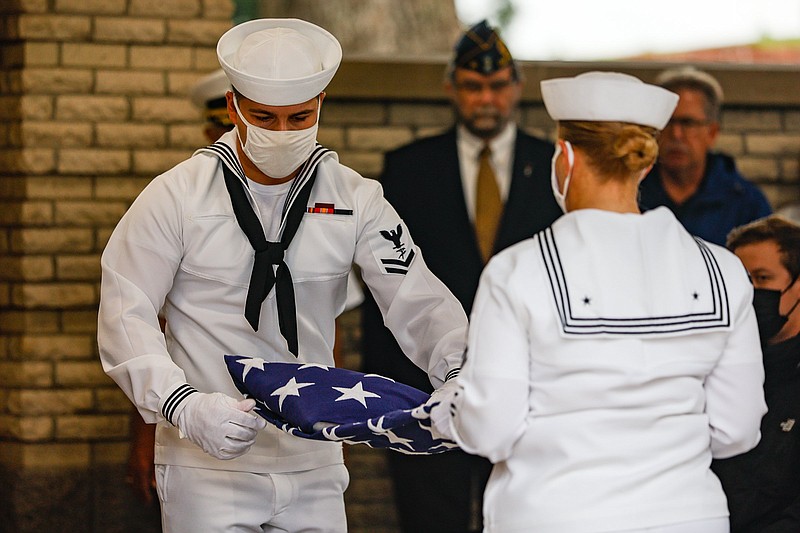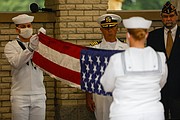The official record shows Melissa Gail Miner was a 51-year-old U.S. Navy veteran who died in July and left no family.
But Renee Chisholm said she attended Miner's Chattanooga National Cemetery funeral Wednesday because she considers her fellow veteran a "sister" – even though they never met.
"To me, when you're military, everyone's your family," said Chisholm, adding that she served in Germany with the U.S. Army nearly 50 years ago.
"My faith and belief are that she knows I'm here, and that I love her," Chisholm said. "I just wish I could have known her."
Miner was homeless at the time of her death, and Sam Wolfe, director of the city of Chattanooga's Office of Homelessness and Supportive Housing, said he'd gotten to know her in recent years.
"Just a sweet lady," said Wolfe, who worked for the city in a similar capacity under former Mayor Andy Berke. "She was pretty secretive, but she shared enough for you to know that she was dealing with issues that haunted her.
"She looked out for others on the street," Wolfe said, "giving to the point that she'd often forgo her own needs and see to theirs."
After Miner died, Wolfe reached out to retired Navy Capt. Mickey McCamish, who serves as director of the Southeast Tennessee Veterans Coalition, for help in arranging her burial at the national cemetery. McCamish said the initial application was denied because Miner had served on active duty for only 22 months – two months short of the minimum required for burial in a national cemetery.
McCamish said he then made it his mission to get a waiver from the U.S. Department of Veterans Affairs. After more than two months of work with staffers in the offices of U.S. Sen. Bill Hagerty, R-Tenn., and U.S. Sen. Marsha Blackburn, R.-Tenn., the waiver finally came in late September.
"I just didn't want to leave Missy behind," said McCamish, who spoke at Miner's funeral. "It was worth my time and effort to get this waiver for her to be buried with honor at our national cemetery."
On its website, the National Coalition of Homeless Veterans quotes a U.S. Department of Housing and Urban Development estimate that more than 40,000 veterans are homeless on any given night. The coalition further notes that while veterans account for 7 percent of the U.S. population, they make up nearly 13 percent of the nation's homeless adult population.
One reason for homelessness among veterans is that "military occupations and training are not always transferable to the civilian workforce," according to the coalition.
McCamish said it comes down to veterans having to make a significant adjustment.
"Even as a very junior person, you have high levels of responsibility in the military," he said, "and a certain level of respect goes with that responsibility.
"Then, in the civilian world, that goes away. The job offerings, the responsibilities don't equate. Veterans are sometimes not ready to accept a lower level of responsibility. It can feel almost like failure, and it can start a downward spiral that some veterans never pull out of," McCamish said.
One of the factors influencing all homelessness, not just veteran homelessness, is an "extreme shortage" of affordable housing, the coalition states. Wendy Winters, executive director of the Chattanooga Regional Homeless Coalition, said a lack of affordable housing has forced her agency to find creative ways to use resources.
"We used to put one person in a one-bed or studio in the past," she said. "Now we're looking at four people in a four-bedroom unit, a roommate situation. It's not ideal, but it's better than sleeping on the street.
"And if you get a Section 8 voucher," Winters said, referring to the federal government's subsidized housing program with its long waits, "you might as well set it on fire."
Contact Bob Gary at news@timesfreepress.com.
Homeless veterans
— 13 percent of the U.S. homeless adult population are veterans.— 20 percent of the male homeless population are veterans.— 68 percent reside in the core city of a metropolitan area.— 32 percent reside in suburban/rural areas.— 51 percent of homeless veterans have disabilities.— 50 percent have serious mental illness.— 70 percent have substance abuse problems.— 51 percent are white males, compared to 38 percent of non-veterans.— 50 percent are age 51 or older, compared to 19 percent of non-veterans.Source: National Coalition for Homeless Veterans

